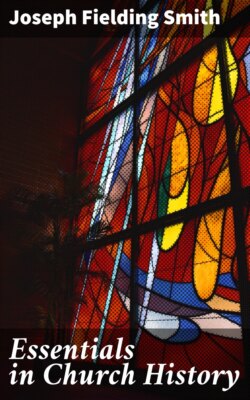Читать книгу Essentials in Church History - Joseph Fielding Smith - Страница 45
На сайте Литреса книга снята с продажи.
Scripture-Reading Forbidden
ОглавлениеTable of Contents
An English chronicler, Henry Kneighton, many years before the “Reformation” expressed the prevailing notion about the reading of the scriptures when he denounced the general reading of the Bible, lamenting “lest the jewel of the Church, hitherto the exclusive property of the clergy and divines, should be made common to the laity.” Archbishop Arundel in England had issued an enactment that “no part of the scriptures in English should be read, either in public or in private, or be thereafter translated, under pain of the greater excommunication.” The New Testament translation of Erasmus was forbidden at Cambridge, and the Vicar of Croyden said from his pulpit: “We must root out printing, or printing will root us out.” In the reign of Henry VIII the reading of the Bible by the common people, or those who were not of the privileged class, had been prohibited by act of Parliament, and men were burned at the stake in England as well as in the Netherlands and other parts of Europe for having even fragments of the scriptures in their hands.
For those who were considered derelict in church duties or heretical in doctrine, edicts were declared, forbidding them to gather in private assemblies for devotion, in various parts of Europe. All reading of the scriptures; all discussion within one’s own doors concerning faith, the sacraments, the papal authority, or other religious matter, was forbidden “under penalty of death. The edicts were no dead letter. The fires were kept constantly supplied with human fuel by monks who knew the act of burning reformers better than of arguing with them. The scaffold was the most conclusive of syllogisms, and used upon all occasions” (The Rise of the Dutch Republic, Motley).
